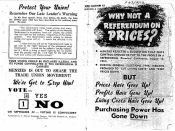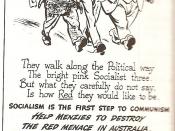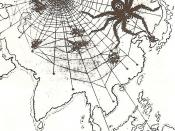AUSTRALIA AND ANTI-COMMUNISM
By Brandon Khoo 10L
The 20th century saw the apparent spread of a new force in politics known as communism. The Soviet Union and China, two major countries in Asia had fallen to communist rule. The western world was aware that communism in any country would remove freedom and individual rights. The potential threat of this force sent fear throughout the world and the leaders of democratic countries. Uneasiness was especially obvious in Australia, as communism seemed to be moving its direction. These fears heavily affected everyday life, parties within the government and the decisions made by Australia.
The stance of the Coalition, lead by Robert Menzies had a substantial impact on Australian Politics. The government, especially the Prime Minister held deep set fears about communism due to its astonishing success and brutal spread through Asia. Australia as a whole believed that the spread of communism would endanger the land and its security.
Menzies was aware that communists often lead supporters in a revolution which would consume the country, resulting in a change of government. It was certainly apparent that Australian communists were taking action within trade unions, which concerned Menzies and many others greatly. This meant that communism was more than a threat in parliament. The coalition made sure that the public was apprised about the 'domino effect'� and the communist menace, thus gaining the support of many voters, naturally some people did not agree. The coalition's attitude toward communism influenced the political direction and support for itself tremendously.



Great essay with reliable bibliography.
Great use of resources.
0 out of 0 people found this comment useful.